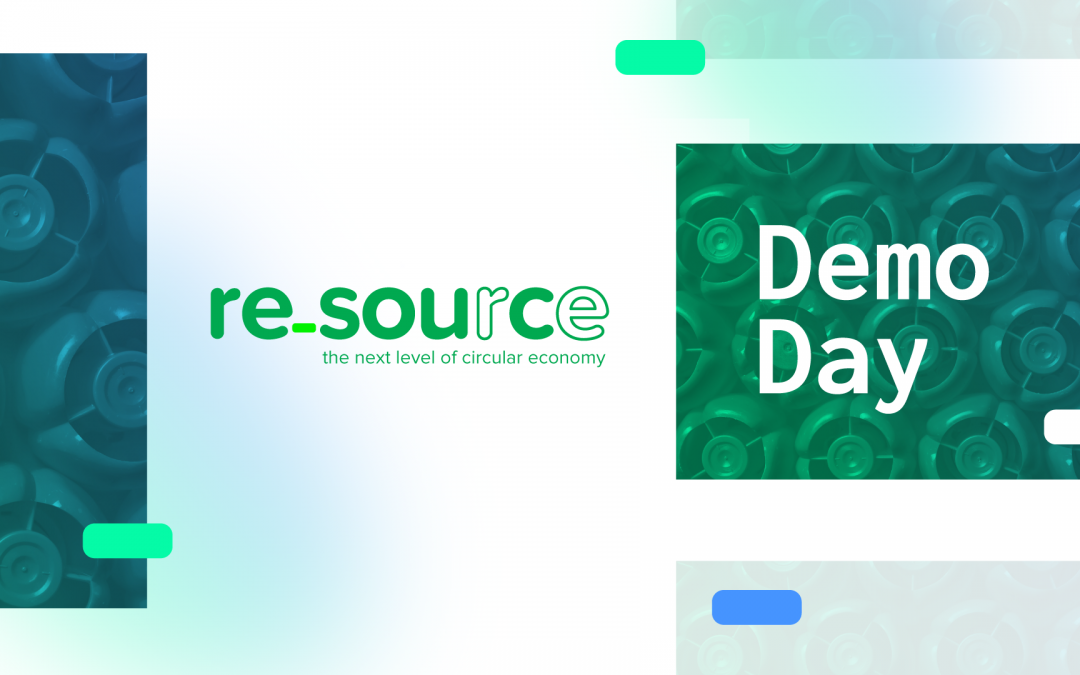
by cristina | Dec 14, 2021 | Corporates, Startups
“This partnership with Beta-i brought us extraordinary results, because we got to the end with solutions that actually solve critical and real problems and are aligned with Sociedade Ponto Verde’s strategic goals.”
Ana Trigo Morais, CEO at Sociedade Ponto Verde.
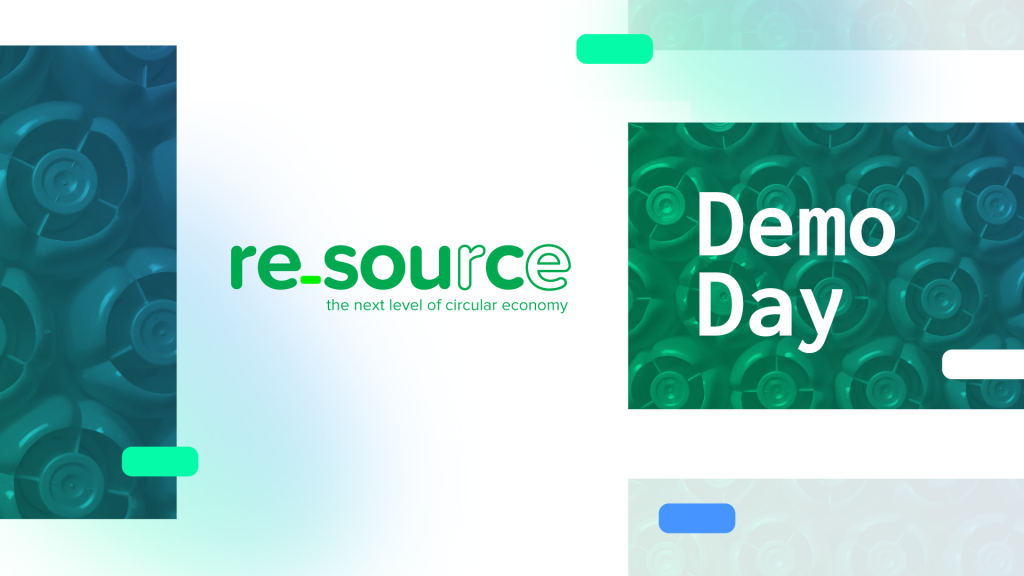
The Demo Day of re_source program marked the end of this pioneer edition in taking the next level of circular economy. It was also the time to show the collaborative work made between the startups and the pilot partners, throughout the last months:
FYCH & Nestlé | Tratolixo | Sociedade Ponto Verde
Startup FYCH, from Spain, is fighting the lack of structure to recycle multilayer packaging and the negative impacts that this gap has for brands. The innovators at FYCH are doing it together with Nestlé, Tratolixo and Sociedade Ponto Verde, by implementing – in recyclers of the Integrated System of Packaging Waste Management (SIGRE) – their delamination technology to separate the various layers of materials of these packages and enhance their recycling.
FYCH & Lusoforma
This time partnering with Lusoforma, the startup has also tested its technology in the recycling of the lid of aluminum take-away products, which are composed of paper, plastic and aluminum, obtaining separation results of 100%.
Magnomer & Super Bock Group | Tratolixo
Magnomer is creating a pilot with the Super Bock Group. The project consists of creating labels with magnetized ink, meaning they can be more easily separated from the plastic, hence allowing for better packaging recycling. The solution from the North American startup can increase recycling levels by up to 20% and make Super Bock the first company in Portugal to apply 100% recyclable labels on its bottles. Tratolixo will also be a partner in the screening tests of these packages.
Reath & Sociedade Ponto Verde | Super Bock Group
Coming all the way from Scotland, Reath has teamed up with Sociedade Ponto Verde and the Super Bock Group to monitor the packaging life cycle – through the creation of a digital passport to be placed on physical products. Overall, this solution will provide companies and consumers with the proper data on the usability and life cycle of a package and on which products are placed inside. Specifically to Sociedade Ponto Verde, it will allow the company to obtain information on non-reusable packaging placed on the market, as well as the necessary information to fill out the annual declaration (document that companies adhering to the Green Dot system fill out annually to report the total weight of this packaging).
Polytag & Lipor | Tratolixo | Sociedade Ponto Verde
Polytag, from the UK, has teamed up with Lipor, Tratolixo and Sociedade Ponto Verde to create a digital deposit return and rewards scheme in the Porto area. Their solution will use Polytag’s “describe, tag and trace” technology to first tag products with unique identifiers. Then, it will allow consumers to scan the codes with a purpose-built application and claim their deposits in the comfort of their homes. All this, without having to use inconvenient and expensive vending machines. The packaging will be disposed of via their normal bin or communal container system, creating a cheaper, more convenient and effective deposit return scheme in the area.
MyResonance & Lusoforma | Lipor
Also from the UK, innovators at MyResonance are working together with Lusoforma and Lipor to implement a social network in Portugal. It should use gamification techniques to empower organizations to communicate, promote and engage their communities to take collective action around ESG-based initiatives. This would turn each person/user into a brand ambassador while positively building an online presence and identity to promote a cleaner world.
More about re_source:
Re_source 2021 Video | Re_source: the brave ones taking the next level of circular economy | It’s time for re_source Bootcamp
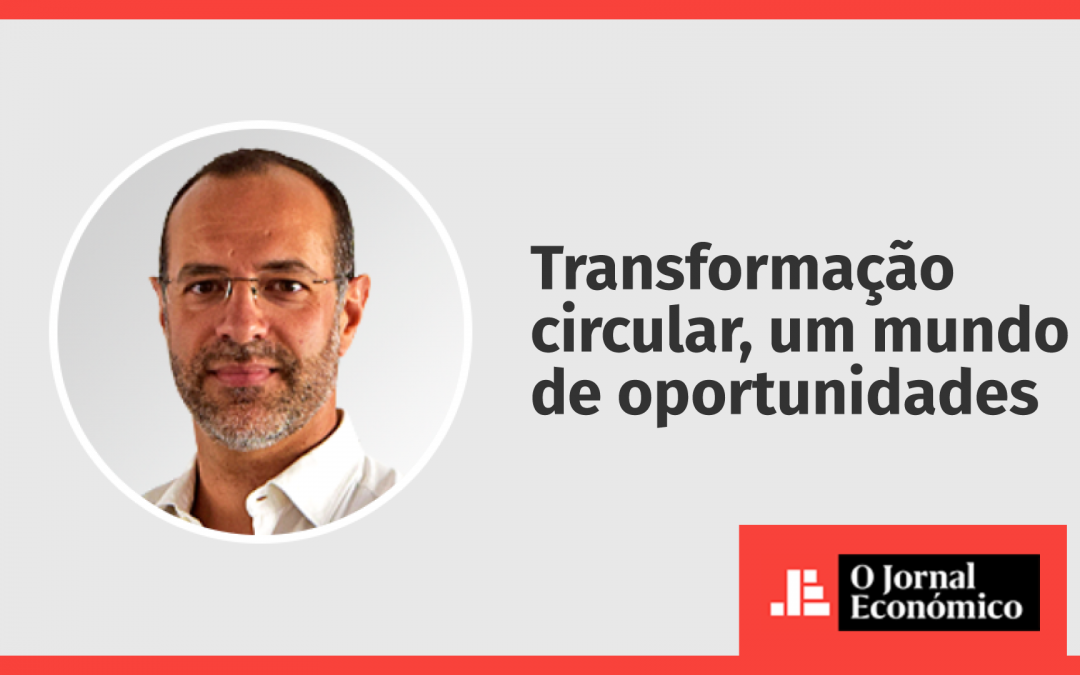
by cristina | Dec 7, 2021 | Corporates, Startups
by Gonçalo Faria* | originally published in Jornal Económico
In the last weeks, no topic has been as talked about as COP26, and there is no shortage of opinion leaders with opposing views on the results and the final agreement. In reality, we are all beginning to realize the scale of the transformation that we will have to face in the coming years and the need to rapidly accelerate a decarbonization that is only taking too long to become a reality. And the fact is that, with or without a COP, with more or less regulation, the business sector in general knows the direction of the actions it should take.
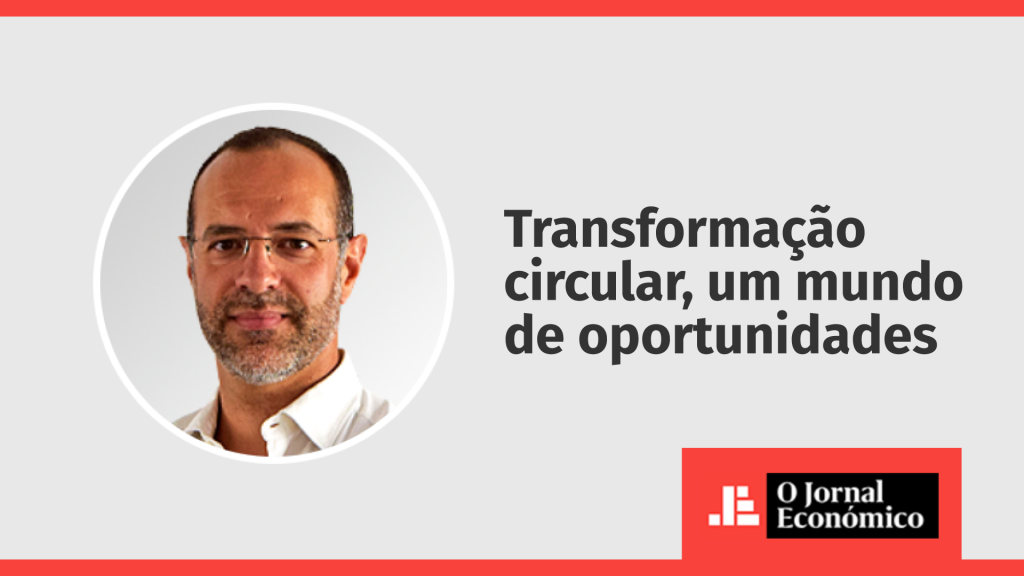
At the same time we are going through a phase in which supply chains are suffering one of the most disruptive periods of our generation, with threats of shortages of essential raw materials, long queues of ships waiting to unload containers, maritime freight prices at unimaginable highs and consequent price increases of raw materials and consumer products.
But what does decarbonization have to do with crises in supply chains? We could talk about the need to curb emissions in shipping and the profound change that this sector will face in the coming years with the reduction targets imposed by the European Commission, and the experiments of introducing green fuels such as hydrogen or ammonia. But there is another important decarbonization lever which will be the paradigm shift of our value and supply chains towards a circular future, with much shorter logistics and a huge reduction in the carbon footprint of the materials we consume.
If we consider only the primary production of metals, currently it represents around 7 to 8% of the global energy consumption. By moving to a secondary use, to a circular chain of reuse or recycling, energy consumption is reduced by a factor of 10. If metals are an extreme example, the need to redesign value chains and the way we consume and derive utility from materials/products, or how companies design this consumption experience, will be fundamental to achieve the much desired carbon neutrality. According to the Circularity Gap Report 2021, doubling the circularity of the global economy from 8.6% to 17% reuse of materials can reduce greenhouse gas emissions by 39%.
This circular transformation is creating very exciting economic opportunities for entrepreneurs and large companies and could have significant potential for increased employment. Entrepreneurs are already playing their part and the challenges of this deep circular transformation are the opportunities they are seizing. This is currently a very dynamic ecosystem, and examples are surely not lacking. Such as Waste Transformers who developed a containerized solution for the anaerobic digestion of organic waste for energy production and organic fertilizer, or Reath who developed a digital passport for materials to enable their Traceability.
We will need to give space to these innovative solutions, new business models and new technologies, and we will only achieve this in a collaborative way and by opening a path of dialogue and experimentation between the various stakeholders such as entrepreneurs, large companies, consumers, regulators and local entities such as municipalities or multilateral ones such as the United Nations and the COP26.
*Gonçalo Faria is Senior Account Manager – Client Success at Beta-i.
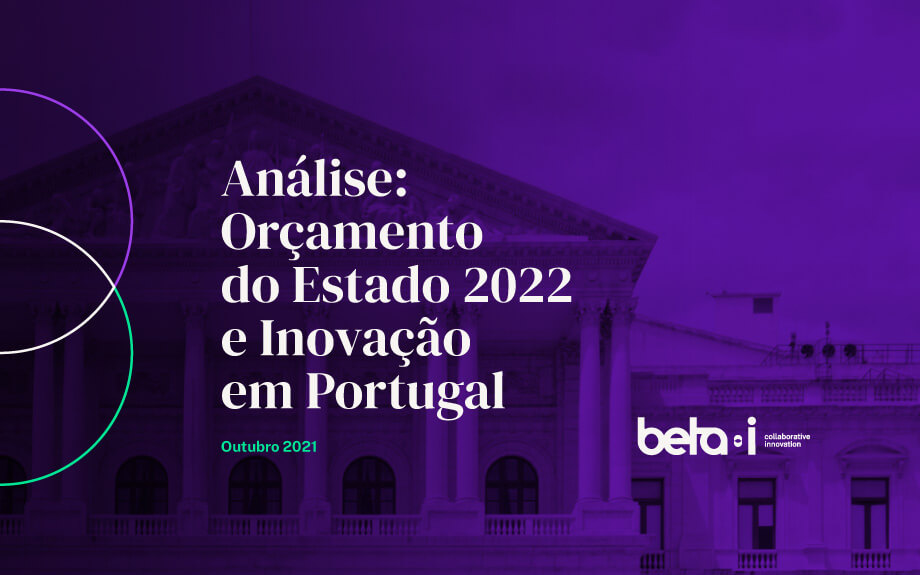
by Alisson Avila | Oct 22, 2021 | Corporates, Investors, Startups
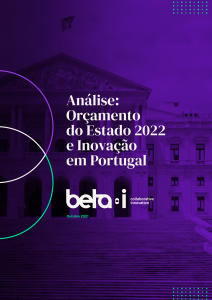
(Descarregue o documento)
Uma análise executiva da Beta-i sobre as propostas do Orçamento do Estado 2022 (OE) para a inovação está disponível para download, com a intenção de apoiar e contribuir para o entendimento de tópicos estruturantes da proposta orçamental para o ambiente de negócios do ecossistema Português.
O documento percorre diferentes nuances do Orçamento do Estado, sumarizadas e acompanhadas pela nossa análise. Entre elas, três medidas de política económica associadas ao ecossistema de inovação emergem enquanto iniciativas de impacto:
(i) A revisão do regime fiscal das stock options para as startups tecnológicas como mecanismo alternativo de remuneração, e a intenção de introduzir um marco legal para as startups – o que pode abrir caminho para toda uma nova forma de participação destes modelos de negócio ágeis e orientados ao crescimento em escala no ambiente macroeconômico do país;
(ii) A medida de apoio às Empresas no Investimento, Inovação, Tesouraria e Simplificação – onde se destaca a majoração fiscal, no âmbito do regime das receitas com patentes, que se mostra potenciadora da competitividade e contribui para a desmobilização de rendimentos;
(iii) O estímulo fiscal à inovação das empresas, favorecendo a exploração de patentes – onde, apesar do ordenamento jurídico português assumir a natureza de benefício fiscal com o aumento da taxa efetiva de IRC de 50% para 85%, tornando assim as receitas de patentes portuguesas competitivas ao nível da União Europeia (UE), existe ainda espaço de ação.
Algumas das nossas análises, sobre estes e outros temas, também inseridas no documento:
# O marco legal das startups é uma necessidade há muito discutida. Esta não será necessariamente uma definição simples de ser conseguida, mas é um elemento importante para a integração das startups no tecido empresarial e no apoio Português a ambições europeias como a implantação das Startup Nation Standards.
# Saudamos o reforço da Startup Portugal e do papel das incubadoras, assim como as iniciativas de apoio à testagem e à integração dos produtos por parte dos agentes económicos. Além disso, iniciativas como os testbeds e as zonas livres tecnológicas, bem como os Vales Startups verdes e digitais, os Vales Incubadoras, as mudanças na ‘patent box’, os Digital Innovation Hubs e as agendas mobilizadoras criam todo um conjunto de frentes de atuação decisivo para acelerar a lógica de inovação no mercado.
# Por outro lado, o OE poderia seja capaz de reforçar a sua atratividade fiscal através de iniciativas associadas à inovação aberta e à colaboração. Os modelos contemporâneos de gestão de inovação, abertos e permeáveis ao envolvimento de parceiros externos especializados, não são um fator de risco para qualquer entidade – pelo contrário, são a sua melhor hipótese de crescimento e sobrevivência. O desenvolvimento conjunto de projetos e pilotos, e de acordos comerciais ligados a patentes e soluções digitais, representam uma visão importante e um entendimento mais abrangente sobre o papel da Investigação & Desenvolvimento na economia, tanto no que diz respeito aos seus processos quanto na sua orientação para o mercado final. A cultura de gestão rumo à inovação e à colaboração pode ser efetivamente acelerada com contrapartidas fiscais, com os ganhos de médio e longo prazo a compensar sensivelmente o investimento associado ao benefício de curto prazo.
# Consideramos que uma dimensão igualmente estruturante para as necessidades económicas portuguesas para a próxima década, as chamadas competências digitais, estão de alguma forma sub-representadas. Sem dúvida, a abordagem do Orçamento revela múltiplos eixos de intervenção e envelopes financeiros; porém não parece haver ainda uma hierarquização clara destas medidas. Este tema se relaciona diretamente com o reforço das cadeias de valor e a produção de bens com maior incorporação tecnológica, de modo a aumentar o perfil de especialização das empresas nacionais. Uma visão mais sistêmica e integrada no tema traria mais ganhos de escala, uma vez que as competências digitais também se conectam a necessidades políticas e sociais como a Coesão Territorial.
Temas como a Energia, a Saúde, a Economia do Mar e, definitivamente, a Sustentabilidade enquanto elemento transversal para a desejada Transição Verde, também seriam inescapáveis no contexto da nossa análise das propostas do OE associadas à inovação. Contudo, optámos por analisá-las ao detalhe após a aprovação final do Orçamento. A Transição Verde, que anda lado a lado com a Transição Digital, será a lente norteadora desta análise posterior uma vez que afeta a todas as indústrias, exigindo uma alteração de incentivos, investimentos, modelos de negócio e comportamentos.
Com este documento, esperamos poder contribuir para os interesses do ecossistema de inovação e startups em Portugal – uma comunidade definitivamente relevante para o futuro do país – e para um ambiente de negócios tecnológico orientado à inovação cada vez mais profissional, informado e envolvido no debate público. Este compromisso também está patente noutro projeto da comunidade digital Portuguesa e europeia no qual a Beta-i está diretamente envolvida: a Portugal Tech League.
Boa leitura! E o seu feedback é bem vindo, através do nosso formulário de contato no site ou do email alisson.avila@beta-i.com.
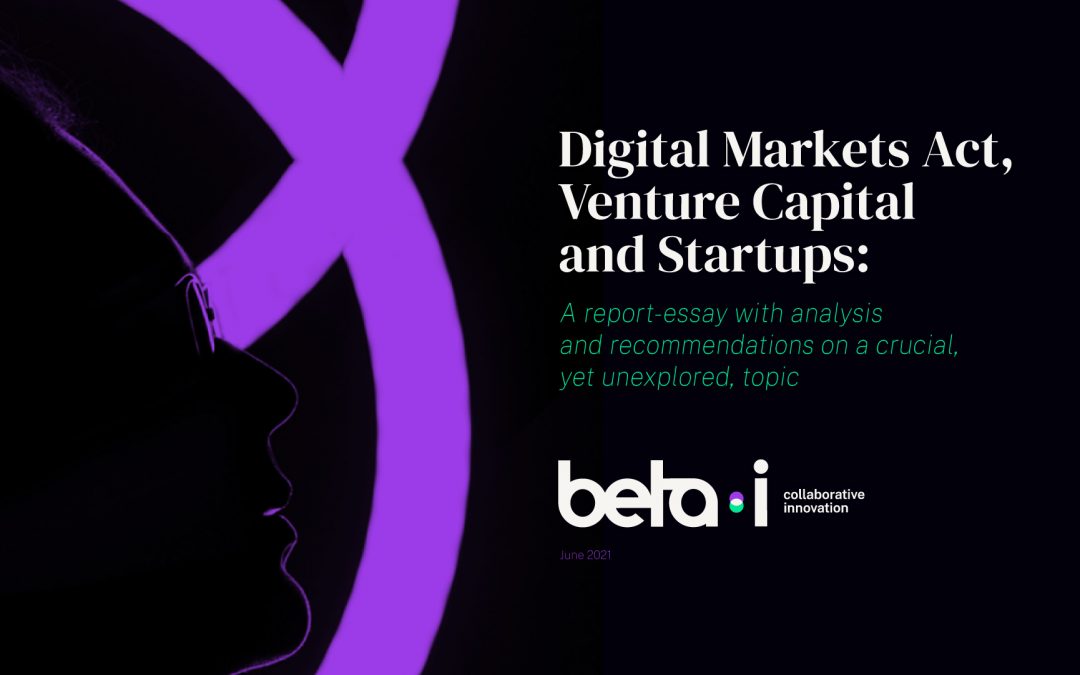
by Alisson Avila | Jul 2, 2021 | Corporates, Investors, Startups
 In this report produced by Beta-i both for the tech community and their policy-makers in Europe, we share analysis and recommendations on a crucial, yet unexplored, topic: the Digital Markets Act (DMA) systemic impact on European startups and scale-ups, with special emphasis on the direct or unintended consequences on venture capital investment.
In this report produced by Beta-i both for the tech community and their policy-makers in Europe, we share analysis and recommendations on a crucial, yet unexplored, topic: the Digital Markets Act (DMA) systemic impact on European startups and scale-ups, with special emphasis on the direct or unintended consequences on venture capital investment.
Available for download here, the document summarizes what the DMA is about and how it can impact European digital companies growth. But above all, shares contributions to the legislative discussion being held on the topic, such as:
# The DMA’s message that growing too much will come at the cost of being regulated ex-ante is still not enough for Europe’s ambitious digital and green transformation goals over the next decade;
# The proposal skips some necessary guiding principles for the single market’s future competitiveness. The DMA could better anticipate ways to support and prepare European startups’ journey towards a “gatekeeper” position within Europe’s digital single market;
# European companies may choose to fragment themselves to avoid reaching the “gatekeeper stage”, which will inhibit their ability to compete on the global stage;
# By being mainly focused on existing large players rather than unleashing innovation from within, the DMA proposal lacks the connection with other EU initiatives to reinforce Europe’s entrepreneurial vision;
# The DMA debate could explore the topic from a more positive perspective, establishing a competitive and inclusive vision, capable of foreseeing scenarios based on collaboration between different business stakeholders, of different sizes;
# Net VC numbers could plunge in Europe for a period still to be estimated, as the impact of the DMA on the ecosystem and the uncertainty it can generate keeps under assessment. The impact could be greater and deeper in more risk-averse investment models such as corporate ventures and regular M&A;
# The theme of mergers, acquisitions and the so-called killer acquisitions should not be framed under a “one size fits all” logic. Each merger and acquisition is the result of differing sets of circumstances which means that not every acquisition is a to-be-controlled killer one;
# The proposal of centralizing within the DMA gatekeepers’ deliberations in the European Commission is interesting and pragmatic, as long as the Commission set up minimum instruments for the Member States to provide timely context and information;
# In regard to data processing and usage, a proposal with a greater focus on what happens at the very beginning of commercial relations between the current gatekeepers and their business users (and then their final consumers/users), would be a simpler way to nudge compliance and neutralize future conflicts of interest;
# The European Commission could double-down in a systemic economic consultation to further preview and anticipate DMA’s consequences on the investment market, and the impact it will have on up-and-coming European players in the digital marketplace.
Commissioned by Google, the report actually translates Beta-i’s perspective from the inside of innovation, digital and entrepreneurship spaces in Europe. The Digital Markets Act is relevant and necessary but could improve its understanding of the interconnected nature of the tech ecosystem. This would be a way to better design any transition towards Europe’s digital competitiveness ambition. We believe it is possible to promote a free market alongside regulatory tools to ensure fair, equitable access to B2B opportunities – while giving consumers choice.
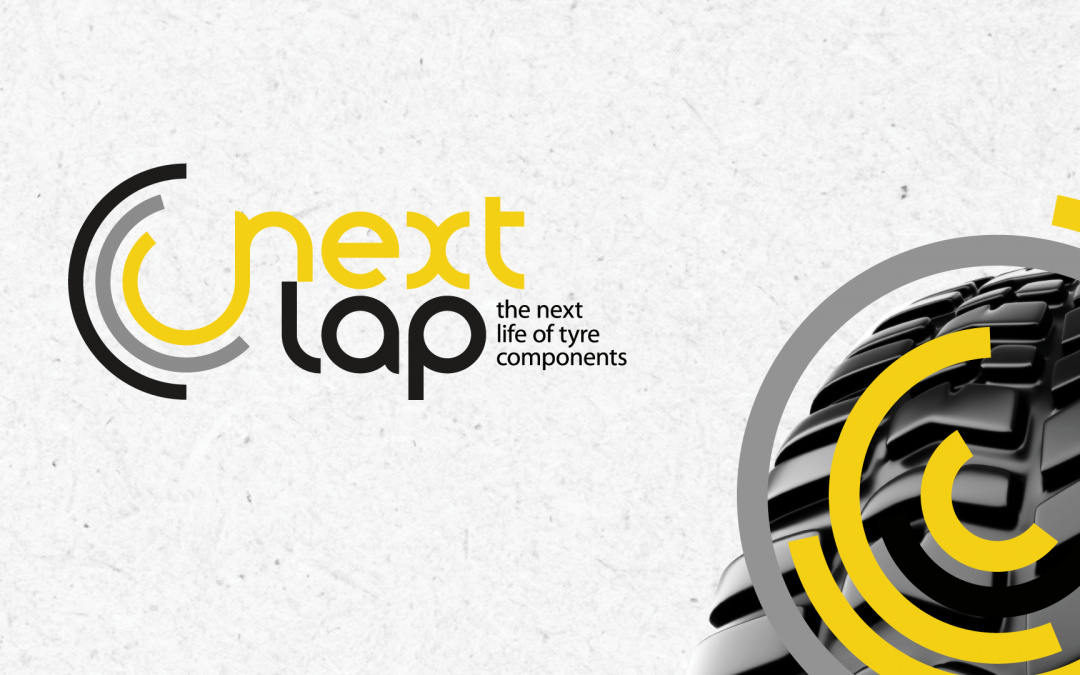
by cristina | Jun 25, 2021 | Corporates, Startups
NextLap is the open innovation program designed to give a new life to tyre components. Between September 2020 and May 2021, it joined innovators and industry partners to develop new solutions focused on the end-of-life tyres and its derived components – rubber, steel, and textile. And the results were truly rewarding!
NextLap is a program by Valorpneu and Genan, developed by Beta-i.
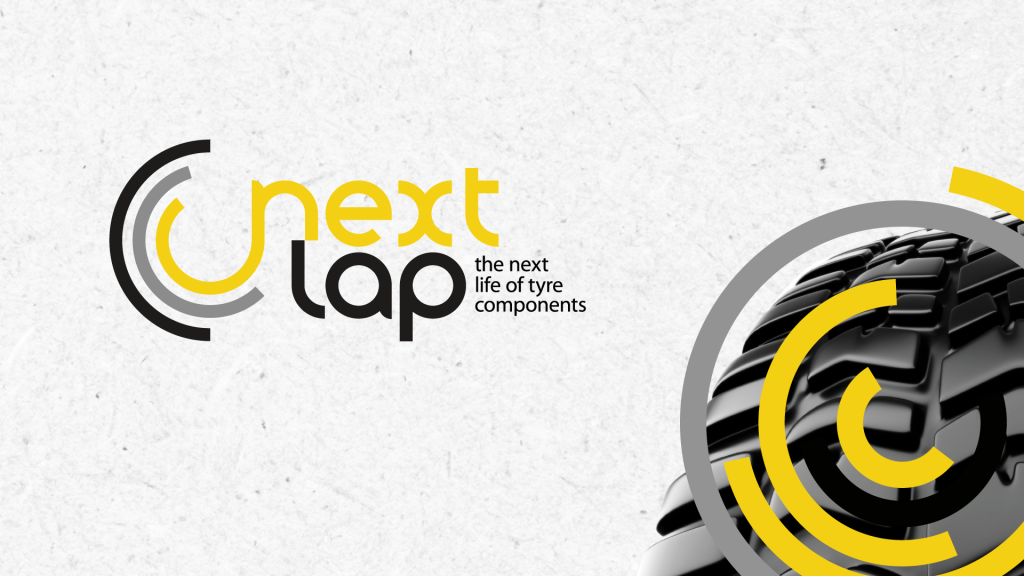
All about Sustainability
The Portuguese newspaper Jornal Económico has summed it up correctly: every year, around the world, over 30 million tons of tyres are discarded. Only in Portugal, we’re talking about 80 thousand tons, with 60% going to recycling and 40% to energy production. According to a study by Valorpneu, one of the main partners of NextLap, per each ton of recovered tyres, we’re avoiding about 1.3 tons of CO2 emissions and saving 37283 energy megajoules.
The most common usages of tyre rubber recovery are usually sports pavements, synthetic grass filling, isolation materials and concrete used in roads and airports. In the end, NextLap is all about sustainability and circular economy. Tyres go circular, always and forever.
Innovation road trip: finding new solutions…
In the end of its journey, NextLap gathered the final innovators and the program’s partners for a demo day, to show results of the work done between each other.
Two of the pilot projects developed during NextLap were the result of a collaboration between the worldwide known Decathlon and two of the innovators of the program: Rubberlink and Tintex, both from Portugal.
The innovators at Rubberlink have designed a devulcanized rubber solution that allowed Decathlon to create a shoe prototype with a recycled shoe sole.
Tintex, on the other hand, has used rubber powder to create the vamp of gymnastic shoes, a product to be tested also by Decathlon. This innovative solution is showing the never thought potential of this tyre material. Besides, Tintex is also considering reusing the textile material from tyres in bicycle saddles.
The program originated a total of five pilot projects.
Pavnext, also from Portugal, has developed an electric solution that reduces the speed of vehicles circulating within regions, covered by rubber made out of tyre recycling. Ruconbar, from Croatia, has presented a solution for acoustic barriers in trailways with rubber made out of tyre recycling.
… and Art
NextLap has taken tyre upcycling to a whole new level: Art.
“UNO” is a sculpture made out of derivatives from pieces of old tyres. This piece of art was made by Filippo Fiumani and João Mendonça (Luzíadas) with the curatorship of Departamento (Bruno Pereira). It gives a new life to materials that no longer have their original purpose.
“UNO” can be seen temporarily in Lisbon, by the docks, in Alcântara.
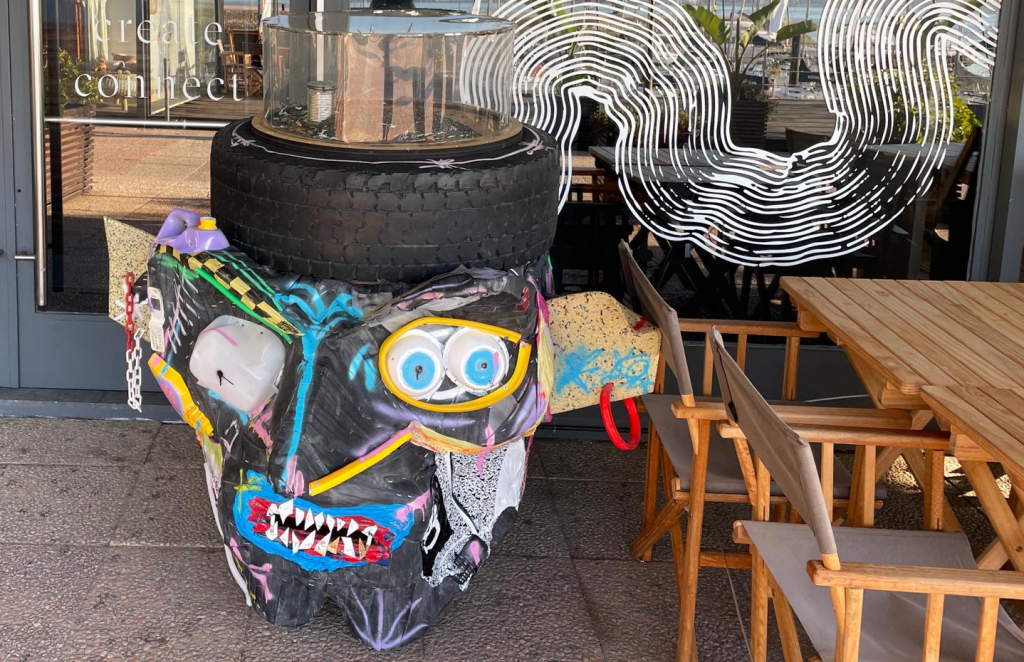
Designing the Future
José de Carvalho, Innovation Director at Genan, sums it right: “The goal of NextLap was to bring together innovators and industries and open the door for new solutions to turn into commercial circuits. The first objective was effectively achieved and, with the creation of the prototypes, it will be possible to evaluate all the inherent properties in order to enable the transition to mass production”
NextLap is just the first step of further collaborations. Innovators and partners have met, worked together and designed a new future for sustainability for the end-of-life tyres. We’re eager to see what the next lap will show.
Thank you!
______________
NextLap Partners
Main Partners: Valorpneu | Genan | Beta-i
Industry Partners: OPWAY | Pragosa | Mobinov | Decathlon | Extruplás | Procalçado | IP – Infraestruturas de Portugal | Houdini Sportswear

by cristina | May 26, 2021 | Corporates, Startups
Free Electrons 2021 Bootcamp is taking place this week, from May 24 to May 27. Four days for the selected startups to showcase their solutions and their teams through a fast-paced pitch event and participate in intense one-on-one meetings with the utilities. Out of hundreds of applications, these were the Bootcamp selected:

Apollo Power | Israel
Apollo Power is an innovation company in the field of Energy. We use our proprietary technology to produce a flexible, durable, lightweight solar film to solve different energy challenges in a new way, both on water, in the air, for infrastructure, or in the automotive industry.
Blixt | Sweden
BLIXT disrupts a 100-year-old industry replacing mechanical circuit breakers with smart digital devices. The Blixt Zero SSCB is x1000 faster, provides circuit level metering and remote real time control of power – all-in-one single device.
Bsurance | Austria
bsurance is a B2B2C, white-label insurtech company focusing on Embedded Insurance. The essence of our business model is to provide insurance to the customer the very moment it becomes relevant within the customer journey, inevitably connecting it to the product or service of their interest, without any interruption of their purchasing process.
Camus Energy | USA
Camus Energy is building an open source software platform to enable the future Distribution System Operator (DSO). Camus’ platform empowers industry leaders to safely and strategically manage a rapidly changing grid environment.
DABBEL – Automation Intelligence | Germany
The DABBEL AI is a pure software solution that replaces the manual control of the existing Building Management Systems in commercial buildings with Artificial Intelligence.
Duckt | Estonia
Duckt, is a universal micromobility infrastructure solution. You can dock, lock and charge any vehicle in one spot, easy to scale and adaptable with your urban mobility needs.
Electron (UK) | United Kingdom
Electron’s solution is a configurable platform for local flexibility markets. Our software enables companies such as network utilities, municipal suppliers and others to launch and operate markets, communicate with distributed energy resources through price signals, and optimize their combined use of renewable generation or network capacity.
Eliq AB | Sweden
Eliq is the SaaS platform that enables energy companies to deploy applications that help end-customers better understand and manage their energy usage and accelerate their participation in the energy transition.
eSmart Systems | Norway
Our flagship product Grid Vision – an AI-assisted, end-to-end powerline inspection management tool – was first released in 2016 and is currently in use by more than 30 utilities in Europe and the US.
Exceedence | Ireland
Exceedence is an Irish SME that provides renewable energy financial modelling software and consultancy with particular expertise in marine and offshore renewables.
Exeri | Sweden
Smart Grid SurveillanceTM (SGS) is Exeri’s comprehensive system that enables real-time situational awareness and decision support for the distribution grid.
FiberSense | Australia
We sensorise existing installed Fiber Optic cables (usually telco fiber in cities, or for subsea High Voltage lines dark fiber installed along the cable, for overhead OPGW fiber is usually already available).
FSIGHT – Energy Flows | Israel
State-of-the-art artificial intelligence software solutions for the energy market. FSIGHT’s AI technology platform is specifically built to take advantage of the new decentralized energy market and smart metering data to increase revenues and reduce costs.
Gilytics | Switzerland
Gilytics delivers a Cloud GIS-based platform and service solution allowing users to calculate alternative routes for power lines, pipelines, roads, and railways, helping energy, engineering and transport companies save time, money and CO2 with better data, visuals, and communication to grow.
Go To-U | USA
GO TO-U is a platform for electric vehicle (EV) charging management and operations. Our proprietary software technology enables charge point operators to drive 2x higher utilization of charging locations, enhancing EV drivers’ satisfaction and loyalty.
GreenValley International USA | USA
The company provides a wide-range of advanced aerial,terrestrial, and mobile LiDAR survey and mapping hardware systems as well as cutting edge software and service solutions.
Gridcognition | Australia
Creates a sophisticated digital twin of your existing and future energy projects, running thousands of simulations in a single click, optimising technology & commercial decisions across far more variables than was previously possible, to drive the best possible environmental and financial outcomes.
gridX | Germany
gridX uses edge and cloud services to develop digital solutions for smart charging and energy management to make renewable energy accessible to all, independent of manufacturers.
HyBird | United Kingdom
Through its unique 3D reality models, AI algorithms, and workflow integration, Clarity delivers benefits in business continuity, knowledge management, cost reduction, remote cooperation, and digital transformation.
KelTech IoT | Ireland
Our Dual Distributed Network (DDN) solution optimises the deployment of communication networks by combining electricity and fibre in an ‘all-digital’ solution using Digital Electricity.
LiveEO Berlin | Germany
LiveEO applies tailor made machine learning algorithms to satellite and aerial imagery in order to assess the vegetation risk alongside TSO & DSO networks globally.
Liight App | Spain
Liight incentivises users to adopt sustainable habits like walking, cycling or recycling through gamification, smart-city mechanisms and artificial intelligence.
Measurable.energy | United Kingdom
The measurable.energy (m.e) Platform is the ultimate building control, automation and management system to eliminate wasted electricity and Greenhouse Gas (GHG) emissions.
Nuventura | Germany
Nuventura develops sustainable gas insulated switchgear (GIS) for medium voltage (MV) electricity grids.
Plexigrid | Sweden
Plexigrid develops network management platforms for DSOs and distributed resources management platforms for retailers and aggregators.
Prescinto Technologies Pvt Ltd | India
Prescinto’s AI-powered SaaS platform collects solar plant data, applies data science models to identify causes for underperformance, and suggests work orders to increase power generation.
PROXXI | Canada
Proxxi is a smart sensor that protects workers by sensing when they get too close to an electrified device.
REBASE Energy | Sweden
Rebase Energy provides data and digital tools for forecasting, optimisation and trading of weather-dependent distributed energy resources.
Social Energy SE Group | United Kingdom
Our Artificial Intelligence and predictive analytics make profit from the growing number of prosumers and renewable energy assets on the grid.
SubSea Mechatronics | Spain
Over the years, we have developed pipe-inspection services with ROVs and AUVs and their maintenance and repair together with IoT for water applications, besides a range of underwater inspection products.
Tacit.io | USA
An integrated solution that is designed to provide field employees in industries such as Power/Utilities, AEC/ Construction, Industrial Equipment and Oil/Gas and others an integrated experience for real-time collaboration, knowledge management and to leverage remote experts who can better help them get their job done.
VECKTA | USA
VECKTA is the Energy Transition Market Platform, empowering a more sustainable, profitable and distributed energy future.
Voltaware Europe | United Kingdom
Voltaware is a London-based startup using smart meter data to create game changing products that help utilities engage customers and generate new revenue streams.
Yotta Energy | USA
Yotta Energy (Yotta) has created the first panel-level energy storage solution that fits perfectly behind any industry standard solar module, neatly integrating into PV racking.
Zinier | USA
Low-code Field Service Automation Platform, powered by AI. We empower field service organizations to reach their full potential, delivering always-on service, while future-proofing for the unexpected.








 In this report produced by Beta-i both for the tech community and their policy-makers in Europe, we share analysis and recommendations on a crucial, yet unexplored, topic: the Digital Markets Act (DMA) systemic impact on European startups and scale-ups, with special emphasis on the direct or unintended consequences on venture capital investment.
In this report produced by Beta-i both for the tech community and their policy-makers in Europe, we share analysis and recommendations on a crucial, yet unexplored, topic: the Digital Markets Act (DMA) systemic impact on European startups and scale-ups, with special emphasis on the direct or unintended consequences on venture capital investment. 



